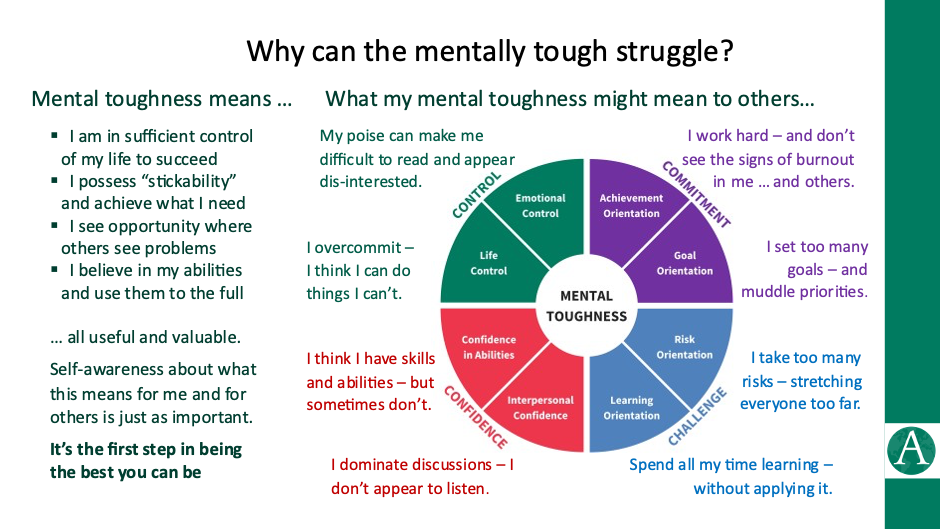“The 3is – Icarus, Intolerance, Icon”. Three reasons why there may be potential downsides to being mentally tough.
Generally, we see that being mentally tough carries with it a number of advantages when it comes to life and work.
The mentally tough are often described as being “comfortable in their own skin”. They cope well with the ups and downs of life and work.
Most of the time, this enables them to deal with stressors and pressures without being adversely affected. They respond positively to challenges and to sudden changes or crises. They are able to see opportunities and are often well-equipped mentally to grasp those opportunities.
When failure or setback arises, they can keep those in perspective and can take them in their stride.
They generally achieve more often than they fail and tend to deal with failure in a more constructive way often learning valuable lessons from setbacks.
However, having high levels of mental toughness is not without its potential for disadvantage and can give rise to situations where these same positive qualities can become a potential liability or a negative quality. This can, at times, undermine the mentally tough individual’s ability to succeed.
One example is having a high degree of achievement orientation. This generally enables the individual to apply enough effort to complete a task where others might baulk at this. However, it can also mean that the individual makes a lot of effort when even that is not enough. Simply working hard doesn’t always work. And overdoing it can lead to “burn out”.
More examples are shown below.
These negative aspects arise, in general, from the failure of the mentally tough individual to be fully self-aware about who they are and the implications of this for others and for certain situations.
Once again, we see that self-awareness about one’s mental toughness is crucially important.
The potential downsides fall into three broad groups. We can for convenience call them the 3is.:
The Icarus effect – believing they can succeed at most things; they can attempt to succeed in situations where they realistically can’t. They try to fly too high. Example: “I believe I have the ability to do it …” when it’s really beyond you.
The Intolerance effect – a failure to recognise that others are not like you and being intolerant of that gap, resulting in showing that intolerance – even when others bring other useful attributes to the party. Example: “I can do it, why can’t you?”
The Icon effect – your attributes can appear exceptional, even superhuman, to others. They are respected, even admired. Others can be overawed and become reluctant to engage because they feel inferior. They can be intimidated by the mentally tough without the mentally tough actively seeking to do that.
None, all, or some of these effects can emerge.
This is why self-awareness is as important for the mentally tough as it is for the mentally sensitive.
This image summarises some of the potential downsides:

Set out below are examples of behaviours and situations which can become problematic for a mentally tough person. They are shown by factor. Note that some of these behaviours might be associated with more than one factor.
A fuller exploration can be found in Developing Mental Toughness (Ed 3) (Kogan Page 2021, Strycharczyk, Clough and Perry
Life Control
|
Emotional Control
|
Goal Orientation
|
Achievement Orientation
|
Risk Orientation
|
Learning Orientation
|
Confidence in Abilities
|
Interpersonal Confidence
|
In our work developing individuals and organisations, we can often find that we are dealing with the consequences of mental toughness as well as the consequences of mental sensitivity.
Mental toughness can bring advantages to the individual and the organisation but that can be significantly diminished by a lack of self-awareness about this key concept.
AQR International work, in collaboration with key academic partners, has enabled a reasonably detailed and practical understanding of this concept.
Together with the development of the mental toughness questionnaires (MTQPlus), practitioners of all types now have the capability to explore this with clients and support them on the journey to being the” best version of themselves that they can be”.
To inquire about training to use the mental toughness measures e-mail headoffice@aqr.co.uk
Listen to our ‘Talking Toughness’ podcasts where professionals from around the world are applying the 4Cs Mental Toughness concept to all walks of life and work.


